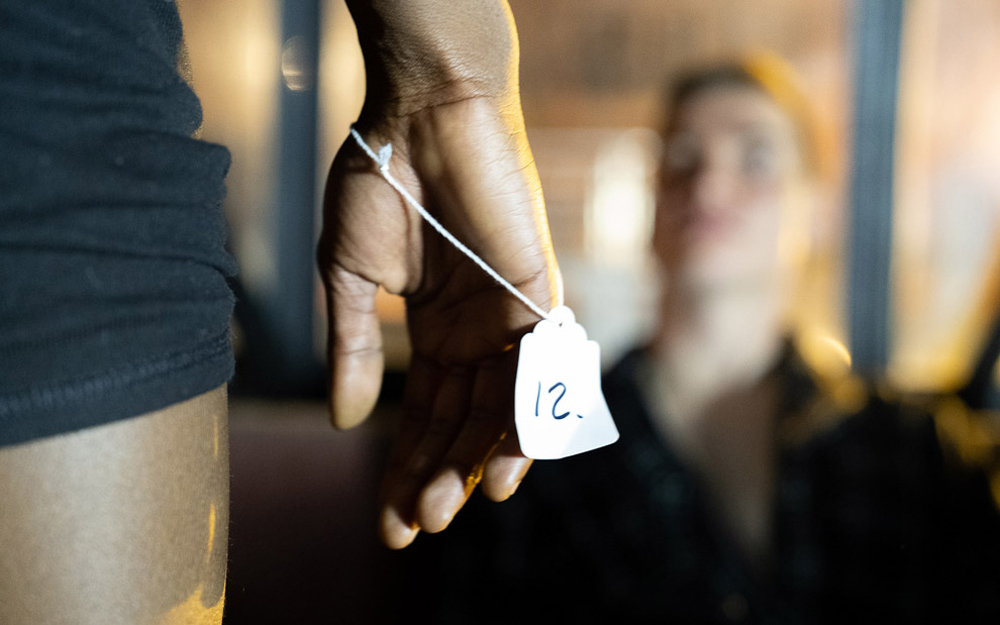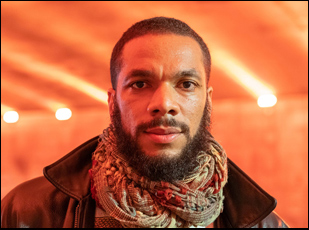When Elegance Bratton and Jovan James arrived to shoot a scene for their new film “Buck,” they were surprised to learn out of the 20-30 extras they were expecting, only eight would be able to make it, the kind of trial by fire you’d expect for an NYU student thesis film. Yet speaking to how accomplished the resulting short would become, premiering this week at the Sundance Film Festival, the co-directors and their crew didn’t panic, having their production designer Daniel Ornitz relocating what was to be a Caligula-esque evening of debauchery from a warehouse to a boat, intensifying the isolation the film’s main character Lynn (Malik Shakur) experiences in a setting that’s supposed to take his mind off the pain of being a young African-American man living with HIV.
“Initially, I wasn’t down with it, but Chester [Algernal Gordon], my husband and our producer who produces all of our work, of impressed upon us why not try something different and see what happens?” says Bratton of changing the locale of the film’s pivotal moment. “But we realized that perhaps the more powerful way to communicate his loneliness is an unexpectedly intimate setting where there is nowhere to go but to one another, and he still feels jettisoned. I can’t say we had a lot of meaningful conversations about the role that consent plays within the dramatic arc of this character [before filming], but having it be a smaller party with less people also allowed us to be able to really highlight the nature of consent, the commodification of the black body and these tags that are put on and these looks that they’re given.”
If an open mind led to a narrative epiphany for Bratton and James, it is something they generously pass along to an audience with “Buck.” With a title that coyly alludes to the recent deaths of the young gay, black men that have entered the house of the L.A.-based businessman and political fundraiser Ed Buck never to be seen alive again without seeming consequence, the film offers up a beautifully empathetic portrait of one such person in Wynn, whose desperate search for acceptance only leads him into greater despair. While Bratton and James stage quite a private party for him to attend, they cleverly bookend “Buck” with glimpses into his daily life, allowing the more quiet moments speak volumes, such as begrudgingly speaking to his mother when he doesn’t want to answer questions about his condition and looking longingly at the coastline of his native Baltimore, knowing how tied to the ground he is.
Although they tell just one man’s story in “Buck,” Bratton and James know they are giving voice to countless more and the short film carries the full freight of that power, like it’s main character turning what may appear at first to be a burden into a considerable strength. On the eve of the film’s premiere in Park City, Bratton and James were gracious enough to speak about how their collaboration took shape, coming together for “Buck” and how they’ve embraced the role of having to develop the infrastructure to tell stories of their community after the industry has ignored them for so long.
Jovan James: Well, this was an NYU grad film thesis project, and I started off exploring the mental health crisis in the black gay community, so I was seeing the rise in suicide rates, the increased drug use and the effect that this has on the most vulnerable people in our society and I wanted to explore how to turn that into a story that could speak to today’s generation because many people in this generation are affected by depression and they’re turning to drugs and to salacious behavior in order to treat that.
Elegance Bratton: And this is actually our third film together. We met our first year at Tisch Grad Film in the Masters program and in each one of those films, we’ve been really adamant about raising up black queer male subjects. We’re in this incredible moment of trans visibility that is much deserved and so necessary while simultaneously what’s happened is there’s a lack of visibility around black gay men and the things that they’re going through. Looking at the CDC statistics around HIV and AIDS, one in two black gay men are now projected in their lifetimes to be HIV positive, and then we look at a story of Ed Buck, and we see there’s a unique scenario for this generation of young men that are coming of age with the ready availability of apps and the [current] culture of sex, so there is this population of black gay men whose search for happiness through debauchery makes them vulnerable. We wanted to make a film that helps audiences live in that vulnerability and recognize that we are all vulnerable in our own ways.
Jovan James: And everyone knows someone like this. Maybe you’re not aware of that, but hopefully you can see the main character and look out into your life and try to have some more empathy for people who are going through this that you don’t know.
The day-night structure of this really lets you see Lynn as a complete person in a short amount of time. Did it come naturally?
Elegance Bratton: Yeah, one thing I really loved about this idea when Jovan brought it to me was that idea of like spending time with this character and having that time spent account for the emotional arc of the film. By opening in the day and closing in the day, we create a sense of wholeness to who this person is.
Jovan James: And there’s a certain physical nature to how he lives his life. The structure of it shows that he is still trapped in this loop, although at the end, he does show hope and it’s important to see that. This night is different than the other nights, however, so this is not a guarantee that everything is going to be okay, and it was important to show that a lot of this behavior does happen at night. People live a “normal” life during the day, hiding their deepest secrets, fears and pain from who they interact with on a regular basis, even those who love them the most, and at night when they’re indulging in that behavior. Then sometimes it’s just another day and it’s still about making it through that next day.
Elegance Bratton: That’s right, and celebrating that as a triumph when so often you watch movies about people who go through depression and other forms of mental illness, the there’s hope that things can be cured when in reality, hope lies in enduring. There’s a lot of people out here in this Trump America that are struggling for meaning and for their sustenance just to live day to day and we want to honor those people and let them know that we see them.
It was also important not to have a film that was sex negative, but that explored the complicated dynamics of sex and how the things that oppress us during the day can follow us into the bedroom. That dichotomy is something we all have to navigate and make peace with.
A lot of the emotion comes out in the color scheme – how did you go about creating the color palette?
Elegance Bratton: I’m obsessive with composition and mise-en-scene and I really do believe that the blocking of a frame can communicate all of the necessary emotional information for a character and can contribute heavily to their POV. Color is a huge, huge part of that, so this is a film that lives in the idea that the red light district is now at home. Maybe in the prior generation, one would go out to the red light district where you could be gay and be out and seek these types of encounters, but now with social media and apps, that outside ritual is brought inside and that incessant, hyper-sensual loneliness is what the reds mean to me.
Then if you look at Jovan and I’s work together, you also see a consistent meditation on the color blue. We’re both black artists and the Blues is such a uniquely American phenomenon, essentially trying to make tangible our existential pain with both being a citizen and a non-citizen, human and inhuman – the way that the black body has been consumed can make you feel the blues. So it’s important to use that color to keep us in conversation with this legacy of communicating the black experience, particularly the black queer experience.
Jovan James: When we were developing our lookbook, it really was our opportunity to study the meaning of these colors and [realize] this story is about intensity and how the lights externalize that quiet intensity that is within the character – that intense sadness, that intense fear. We have such a quiet lead character that just seeing his aura was a great way to get his mental state in these different situations. We had a great cinematographer and lights were a good way to show what he’s actually feeling in the moment.
You also have a very strong performance from Malik Shakur. How did he get involved in this?
Elegance Bratton: Chester and I are family friends with Mandisa Glover and [her mother] Askake Bomani, Danny Glover’s ex-wife, and we have Thanksgiving with them every year. They’re from the Bay Area and they’re family friends with the Shakurs, so last Thanksgiving, Malik Shakur and his mother came and Asake has this incredible house in Harlem with this incredible track lighting and Malik was sitting under this light and Chester and I looked at each other and Malik is also a musician, but we were like, “That kid could be a movie star,” so when “Buck” came along, it just became the right idea.
Jovan James: We always have an interesting time casting movies like this because when we’re just starting out with our storylines, we’re looking for someone very brave and open. Once we had the script at a good place [for “Buck”], we started looking, but weren’t finding anyone immediately when [Chester and Elegance] told me about Malik, and I said, “Okay, I don’t know anything about this guy, but send me something,” and I get this tape. It was very basic, like a minute-and-a-half cellphone video, but [with] his presence and his body language, it was so instant for me that he was right. I knew that he had never acted before, so I went in cautious, but even before he read the script, I knew he could speak to this somehow. Also discovering new talent is always exciting.
Elegance Bratton: And that’s something that we’ve done together and individually as filmmakers. If you look at the people that have been in our shorts, like for instance, my first short, “Walk for Me,” I had Dominique who ended up becoming Elektra on “Pose,” and then on my TV show “My House,” Tati from that show is now on “Pose” and Precious [Ebony] is traveling the world as a muse for Marc Jacobs. And Jovan had Frank Hertz in one of his early shorts…
Jovan James: Yeah, now he’s a regular on the Fox primetime cop drama “Prodigal Son.” And both actors from my film “The Jump-Off” has been in several TV spots and then the film “Tadpole,” with the three teenage young men, one of them has been working with Lin Manuel-Miranda on “In the Heights.” They’ve all really taken off in the year after we worked together, using what we’ve done [together] as a calling card.
Elegance Bratton: The thing is we’re in this echo chamber about diversity in the industry now, where all these studios and agencies are besides themselves to figure out how to include the voices of those that have not been included before, and that is something that Jovan and I have had to do because of the nature of the content that we make. I’m from the ballroom scene, that’s where I got my start, so I know all these incredible trans and gay and lesbian [people] and everything in between who could be actors or dancers, but Hollywood has not had a place to be in it until very, very recently, so we’ve been fortunate to discover new talent, but I also want to couch that and provide context and nuance by saying we had to because of how recalcitrant the industry has been until the very, very recent past to include people like this. It’s a pleasure to meet the industry halfway by being able to bring individuals like this into our films, our TV shows and our creativity.
What was the collaboration between the two of you like as co-directors?
Jovan James: We became co-directors there on set, right there, and it was a very intense moment of truth for me and I’m sure for Elegance as well. It was really because the story and the actors called out for it. The actors really called out for it, just with the way the performances started to shift when we both were speaking and interacting with Zama [Wahdat], our great DP. We had such an incredible [shared] perspective on it that worked well together and at NYU, we’re given this very egocentric [attitude towards the work where] you are the one. You are carrying it on your back and if you don’t do it, then it’s going to stink and there’s a certain truth to that, but what I think we didn’t really learn in school was the power of collaboration when you share a common goal. People are putting their egos aside because they see the work is truly better this way, and that was beautiful.
Elegance Bratton: Yeah, I echo that 100 percent. I’ve always been creatively attracted to Jovan. He’s been focused on things that matter to me and what I love about Jovan is he makes me realize how important this medium is to share empathy because he never assumes anything about anyone. The only thing he assumes is that we have a responsibility to teach and invite in. And at this stage in my development, it was a real blessing to have been given an opportunity to co-direct a film with him.
What was it like finding out your film got into Sundance?
Elegance Bratton: It was amazing. I’ve been rejected six times in a row and probably six times three because you’re not only applying with your shorts, but you’re applying to the various labs. But the reputation if the Sundance Institute speaks for itself. It’s the number one on-ramp for independent filmmakers in America, outsiders, rebels, people who don’t do things the way you’re supposed to do them and if you get into Sundance, it’ll change your life, so I got a call from a 310 number and to be honest with you, I forgot we had even submitted to Sundance. I had to block it out of my head because it’s so traumatic every time when they say “no.” But my husband Chester, our producer, [said] right before Thanksgiving [when announcements come out], ”Well, you haven’t gotten any rejections yet,” and then on Thanksgiving, we get a call from a 310 number and I think it’s a credit card company I owe money to. But it’s Landon [Zakheim, one of the shirts programmers] and he’s like, “We love ‘Buck’ and we want to invite it.” And I’m like, “Landon, do not fuck with me. Is this for real? Are we really in? Prove it.” He’s like I’m calling it in. And I got up on my couch and I screamed, “Fuck yeah” as loud as I could – it probably scared everybody in my building and then I called Jovan.
Jovan James: I was a little more calm. [laughs] I’m much more internal about things…
Elegance Bratton: I’m…not that way. [laughs]
Jovan James: I’ve had my moments, so those who have seen it, have seen it, but I was a volunteer for Sundance. I was a driver two years ago, so it was an incredible dream for me, but it seemed like such a far away, lofty dream because this film was such a personal story, so when I got the call, I was speechless. I didn’t really know what to say. I was just so grateful and [trying] to take it in and I’m still taking it in. I’ll be having more emotional moments, but I’ll pace it out.
Elegance Bratton: I’m the screamer of the two of us, so I’ll scream for Jovan. [laughs] But I just want to say too that the story of our film is the story of three gay black best friends – me, Chester and Jovan, I met Chester right before I started Tisch and he’s been my guiding light ever since in my career and when [Jovan and I] were at Tisch, we were consistently underestimated, consistently side-eyed even with great success…
Jovan James: Right, because honestly, there are times throughout our time at NYU where we were literally discouraged from working together. I was told during a critique, “Why are you telling these kinds of stories? Who cares?” That was something I had to live with telling my story and then as I matured and grew and talked with Elegance, that stuff is behind us now, but I hope for their incoming students, they don’t discourage us from teaming up to do our best work and lift each other up.
Elegance Bratton: Even if they don’t change, [other filmmakers] can watch this movie and they can see an example of don’t listen to these people. Don’t listen to people that tell you you don’t matter, that tell you what you have to say is unimportant, the people that tell you you don’t know how to say it. Just keep saying it, keep making it, keep doing it, keep knocking. When they say no, keep coming back. And eventually it’ll work if you have friends like these. A huge part of this film for me is to show the world the power of black queer solidarity. We’re so powerful together and [when others] look at a movie starring us, made by us, about us, rooted in our solidarity and our community, they can learn something too.
“Buck” will screen at the Sundance Film Festival as part of Shorts Program 4 on January 26th at 6 pm at the Temple Theatre in Park City, January 27th at 9 pm at the Redstone Cinema 7 in Park City, January 31st at 10 pm at the Holiday Village Cinema 4 in Park City and February 1st at 9 pm at the Broadway Centre Cinema 6 in Salt Lake City.





